Review Article - (2023) Volume 14, Issue 5
Abstract
Many obese people take dietary and herbal supplements to reduce weight, and millions of dollars are spent on these products each year. The efficiency and safety of a number of supplements, however, remain under doubt. Supplements are thought to facilitate weight reduction by increased energy expenditure, satiety, fat oxidation, inhibiting dietary fat absorption, modulating carbohydrate metabolism, elevating fat excretion, boosting water excretion, and improving mood. Due to the area’s rapid development, this study provides an overview of the current research on a few dietary supplements, herbal combinations, and combination products. Further study is necessary to determine the effectiveness of several supplements because they haven’t been put to the test in randomized controlled trials. Patients should be guided through the use of dietary supplements by nutritionists and medical professionals, who should also report any unfavourable side effects to the Food and Drug Administration (FDA). The production, sale, and marketing of these supplements would be subject to additional regulations.
Keywords
Herbal therapy, Weight loss, Green tea, Supplements, Herbalife
Introduction
Several herbs can boost metabolism and aid in weight reduction. Herbs can increase metabolism and aid in weight reduction. They provide a thermogenic impact that raises your metabolism. Other herbs help you feel fuller longer, which helps you consume less calories.
These herbal compositions must be utilized correctly to optimize weight reduction while reducing negative side effects, just like any prescription or herbal cure. Weight loss is possible when weight management herbs are used with a diet and exercise regimen.
Obesity has emerged as a serious health issue in recent years, impacting individuals of all ages, genders, colours, and ethnicities, and its prevalence has been rising at an alarming rate. Pharmacologic treatments for obesity are currently expensive and have negative side effects. Contrarily, natural remedies employed in the traditional Indian medical system have been utilized successfully in clinical practice and may serve as possible targets in the creation of future, less harmful, anti-obesity medications that are more affordable. Numerous bioactive components identified in Indian medicinal plants used to treat obesity underwent a thorough chemical and pharmacological examination. Using information on 30 medicinal plants that are regularly employed in the conventional Indian medical system, pharmacological test results, biological origins, and active anti-obesity principles were considered while evaluating the data on the plants. Over the years, there have been changes in the way overweight and obese people are treated, but the bulk of these drugs are still pharmacological or biological in nature. It’s important to spread awareness of both the usage of herbal remedies for treating and preventing obesity and the data that backs them up (Table 1).
| Botanical name | Sanskrit/offi- cial name | Part(s) used |
|---|---|---|
| Acacia arabica | Babbula | Gum, bark, leaf, fruit- pods |
| Acacia catechu | Khadira | Bark, heartwood, flower |
| Achyranthus aspera | Apamarga | Root, seed, leaf, whole plant |
| Aconitumheterophyl- lum | Ativisha | Root, rhizome |
| Acorus calamus | Vacha | Rhizome |
| Adathodavasica | Vasa | Leaf, root, flower |
| Aloe vera | Kumari | Leaf, root |
| Alstonia scholaris | Saptaparna | Bark, latex, flower |
| Ananascomosus | Ananas | Fruit |
| Anthocephaluschin- ensis | Kadamba | Bark, leaf, fruit, root |
| Azadirachtaindica | Nimba | All parts |
| Berberis aristata | Daruharidra | Root, stem, fruit |
| Betulautilis | Burja | Bark, nodes |
| Calatropisgigantea | Arka | Root, bark, flower, leaf, latex, seed |
| Calicarpa macro- phylla | Priyangu | Flower, leaf |
| Capsicum annuum | Kutavira | Fruit |
| Cassia tora | Chakramardha | Seed, leaf, root |
| Cedrus deodara | Devadaru | Heartwood oil |
| Cinnamomum zey- lanicum | Twak | Bark, leaf, oil |
| Cissampelospareira | Patha | Root, stem |
| Clerodendrum phlo- midis | Agnimantha | Root, bark, leaf |
| Cocus nucifera | Narikela | Fruit, flower, oil, root |
| Commiphora mukul | Guggulu | Gum-resin |
| Coriandum sativum | Dhanyaka | Whole plant, leaf, fruit |
| Costusspeciosus | Kebuka | Rhizome |
| Cuminumcyminium | Jeeraka | Seed |
| Curcumalonga | Haridra | Rhizome |
| Desmostachya bip- innata | Kusa | Root |
| Dolichosbiflorus | Kulatta | Seed |
| Embelia ribes | Vidanga | Fruit |
| Emblica officinalis | Amalaki | Fruit |
| Euphobia nerifolia | Snuhi | Latex, stem, leaf, root |
| Ferula nortex | Hingu | Oleo-gum resin |
| Ficus glomerata | Udumbara | Bark, fruit, latex |
Table 1: List of herbs indicated for obesity in ayurveda text books
Literature Review
Garcinia capsules
Weight loss may be aided by Garcinia supplements in both men and women (Figure 1). The combination of chemicals in Garcinia capsules functions synergistically and could support replenishing energy stores throughout the body, which might enhance the body’s rate of metabolism. It could help to curb your appetite and keep you satisfied for longer. Antioxidants included in Garcinia pills may aid in the battle against free radicals and aid in the body’s detoxification or cleansing. Immunity may also benefit from it. Taken daily, Garcinia supplements may help you feel more energized, active, and aware. Garcinia capsules might support the maintenance of good cholesterol (ADA, 1987).
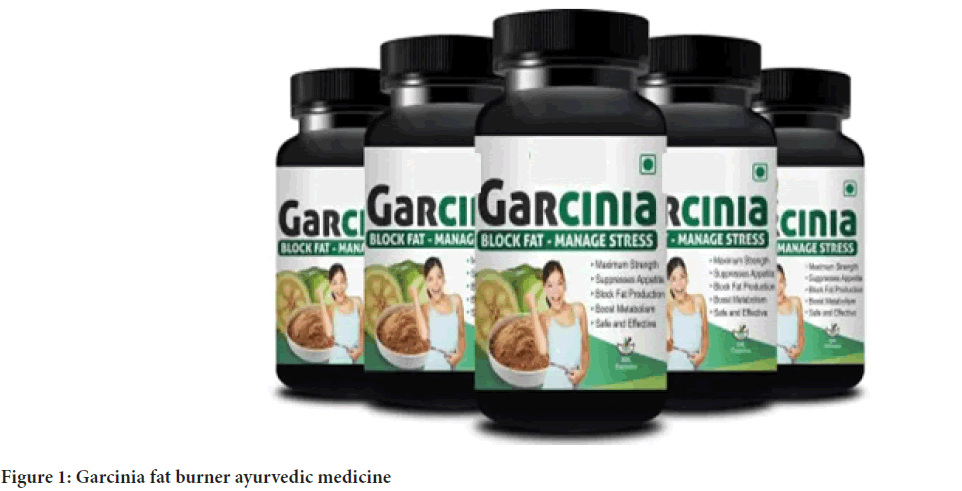
Figure 1: Garcinia fat burner ayurvedic medicine
Dosage-One capsule should be taken twice day with lukewarm water, 30 minutes before meals, or as prescribed by your dietician.
Ayurslim capsules
Capsules that significantly lower the body’s capacity to store fat and the ingredients in this product limit the production of fat and promote healthy weight reduction. Ayurslim is a well-researched ayurvedic herbal product with no known side effects. It also helps the body cleanse and remove toxins (Breskin MW, et al., 1985) (Figure 2).
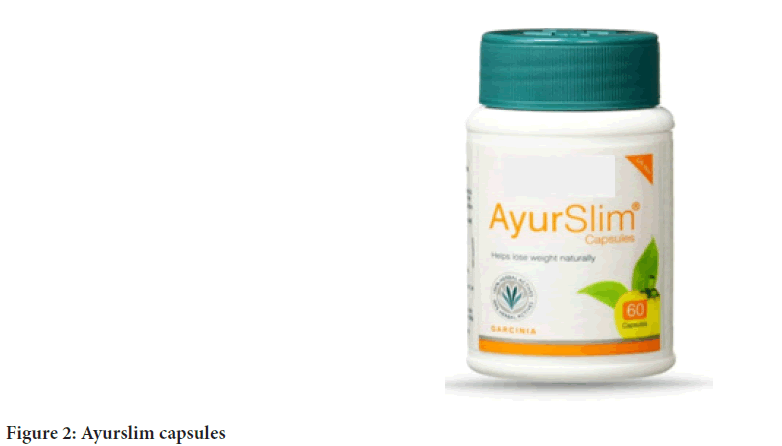
Figure 2: Ayurslim capsules
Benefits
• The Indian bdellium is a wonderful cleansing and rejuvenating agent that also boosts immunity and regulates the body’s levels of cholesterol and triglycerides.
• Garcinia is a powerful plant for reducing body fat accumulation that is included in herbal tablets.
• Fenugreek seed is widely known for its powerful anti-diabetic qualities, which include appetite reduction and an increase in satiety.
• Gymnema reduces the appetite for sweets by increasing insulin production and promoting pancreatic function.
Herbs for losing weight
Along with providing your food flavour, herbs and spices can aid with weight loss. There are five common herbs that can increase metabolism and promote weight reduction.
Turmeric: Turmeric is a vivid yellow spice that is appreciated for its flavour, colour, and medicinal properties. Turmeric’s major component is curcumin (Figure 3). Curcumin will support your weight loss attempts and decrease abdominal fat. Curcumin stops the body from producing fat. Given that turmeric is a warming spice that increases body temperature to accelerate metabolism,
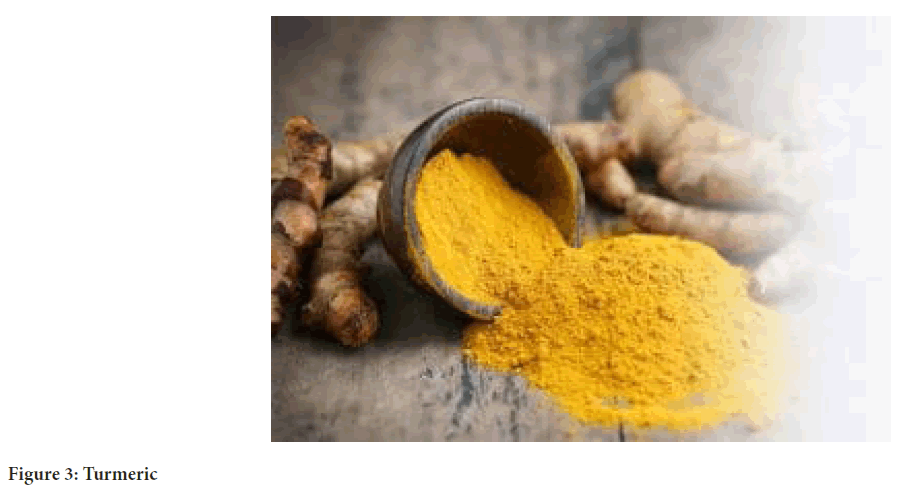
Figure 3: Turmeric
The anti-inflammatory actions of turmeric reduce systemic inflammation. It can also prevent the development of fat tissue and regulate glucose levels by lowering insulin resistance. Bile is used by the body to emulsify fat, and turmeric encourages bile production (Dreyfus PM, 1988).
Ginger: Southeast Asian plant ginger has long been employed in Traditional Chinese Medicine. The major component of ginger, gingerol, is what gives it many of its medical benefits.
Ginger has potent anti-inflammatory properties and lowers oxidative stress in the body. The waist to hip ratio and body weight can both be dramatically reduced with the aid of ginger pills. In addition, ginger lowers insulin and Body Mass Index (BMI) levels. According to research, ginger lowers systemic inflammation while increasing metabolism (FDA, 1974).
Oregano: Oregano is a powerful, aromatic plant that is commonly used in Italian cookery. This wonderful herb has potent antioxidants and chemicals that can help you lose weight and feel terrific. Carvacrol, thymol, and rosmarinic acid are among the terpenoids, terpenes, and phenols found in oregano.
Carvacrol might help you lose weight. It works by influencing particular proteins and genes in the body that regulate fat formation. Oregano also reduces systemic inflammation and discomfort, allowing you to exercise more.
Fenugreek: Fenugreek is a herb used in several Indian recipes and has long been utilized in alternative medicine. Your foods will taste sweet and nutty thanks to this common spice. The nutrients iron, magnesium, and manganese included in one tablespoon of fenugreek seeds boost health. Diabetes and other metabolic disorders may benefit from fenugreek supplements. According to one research, consuming 50 mg of fenugreek powder with meals can lower bad cholesterol, increase insulin function, and lower blood sugar levels.
Fenugreek’s fibre content aids with appetite management and losing weight may be aided by decreased appetite and food consumption. The capacity of the body to turn food into energy might be hampered by systemic inflammation, which is another benefit of fenugreek.
Ginseng: Another plant that is frequently utilized in complementary treatment is ginseng. Numerous studies have been conducted on this root plant. Numerous studies have demonstrated that ginseng can assist increase metabolism and promote weight reduction. In comparison to relying just on regular exercise and a healthy diet, using ginseng will help you shed more weight and body fat.
Through its effects on the hormones adiponectin, leptin, and insulin, ginseng influences the metabolism of fat and cholesterol. Ginseng’s active ingredients, known as ginsenosides, promote fat loss at the molecular level, which reduces appetite and keeps insulin levels stable. Finally, ginseng makes you feel more energized and less tired. Regular ginseng use increases the effectiveness of your body’s detoxification mechanism in removing free radicals and lowering oxidative stress on the body (Greger JL, 1987).
It’s crucial to understand that herbs may improve food tastes and have a variety of therapeutic uses. Herbs like oregano, ginseng, and turmeric assist improve your body’s capacity to burn fat, speed up your metabolism, and curb your appetite.
The frequency of obesity is rising worldwide and is not just a problem in affluent nations. Obesity is directly linked to a variety of significant diseases and disorders, including diabetes, heart disease, atherosclerosis, hormone imbalance, arthritis, and even cancer, in addition to having a negative psychological impact. Thus, maintaining a healthy weight through weight reduction, and more especially, fat loss, is essential for a person’s health and wellbeing. One of the various methods to lose weight is the usage of certain herbs. Herbs do not miraculously cause weight loss; however, they certainly assist.
They serve as stimulants by: Boosting metabolism (thermogenesis) which encourages the body to burn more calories, causing the body to flush out toxins and extra water, acting as diuretics, stifling appetite (reducing hunger), causing bowel evacuation and lowering calorie intake by tricking the brain into believing the stomach is full (Kirsch A and Bidlack WR, 1987).
Herbal remedies may be defined as unprocessed or processed products that are derived from plants or plant components, such as roots, stems, leaves, flowers, buds, etc. and used to treat illnesses or afflictions. Many herbal treatments may help with weight loss and treat associated health problems. Alfalfa, dandelion root, cinnamon, cardamom, green tea, hawthorn, Psyllium, ginger, and garlic are a few of the herbs that have historically been used to maintain and decrease weight (Omenn GS, et al., 1996) (Figure 4).
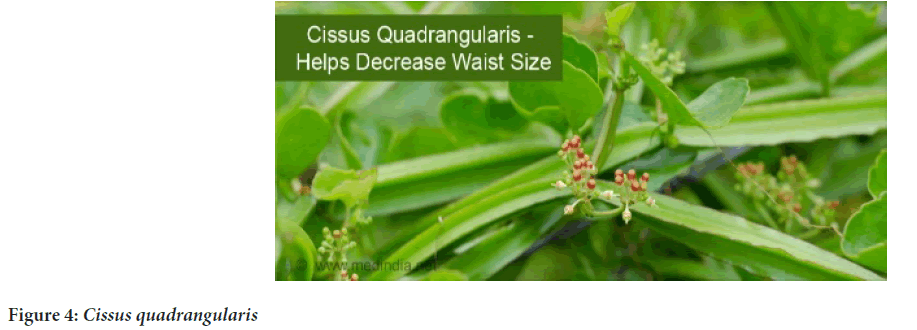
Figure 4: Cissus quadrangularis
Obesity health care pack
Improves metabolism at all levels, especially at the tissue level, flushes out toxins from the systems, opens up clogged channels, reduces body fat, enhances the function of the endocrine glands in the body (Song Y, et al., 2009) (Figure 5)

Figure 5: Obesity health care pack
Slim tea
Aids in weight loss by boosting digestion and metabolism, increases metabolism and digestion to help in weight reduction, enhances digestion and metabolism, encourages bodily cleansing; unblocks clogged channels and helps with weight loss.
Slim tea is a specific ayurvedic herb mix designed to remove toxins from the body. Additionally, it aids in the melting of cellulite deposits. Slim Tea is a natural, time-proven cleansing and rejuvenation tea that increases your metabolism to help you lose weight while improving your general health (Hsia J, et al., 2007) (Figure 6).
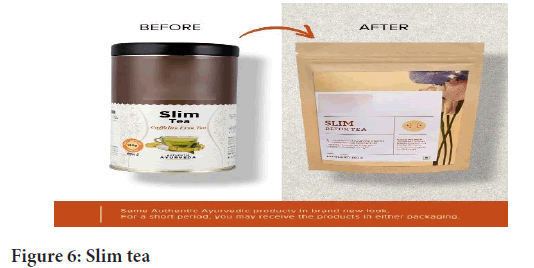
Figure 6: Slim tea
Natural immunity booster
Natural immunity booster increases the body’s capacity to fight common diseases including colds, coughs, and seasonal allergies by boosting the immune system. Ayurveda Chyawanprash boosts the body’s capacity to stay healthy naturally, promotes general well-being, and improves respiratory health (Omenn GS, et al., 1996) (Figure 7).
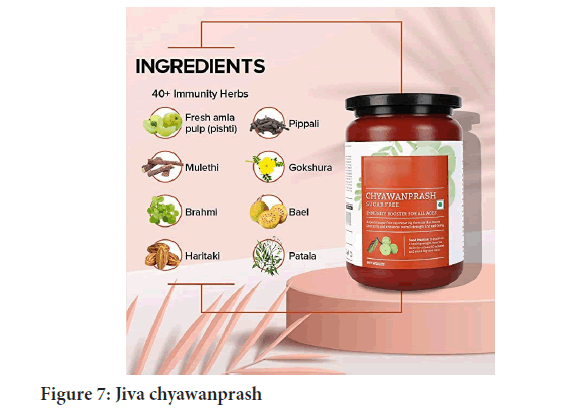
Figure 7: Jiva chyawanprash
Chyawanprash is a traditional Ayurvedic remedy that dates back to ancient India. It has been around for centuries and is regarded by many experts as a necessary health supplement. The mythology of Chyawana Rishi, a forest sage, is where the name “Chyawanprash” comes from. He created this unique herbal mixture to restore his youth, increase his vigor and power. Amla serves as this Ayurvedic Chyawanprash’s primary constituent (ghatak). Fresh seasonal amlas are used to make amla pishti, which is then combined with a decoction of more than 40 herbs and spices to provide you with Chyawanprash’s maximum health benefits. Amla pishti that has been kept or frozen is not used in the procedure. Chyawanprash’s consistency varies and liquefies with time since it is created using a natural procedure and fresh amla pulp. It serves as a barrier to guard the body against numerous seasonal and chronic ailments. It revitalizes the body, feeds the brain, boosts stamina and memory, gives energy and strength, and creates the ideal harmony between the mind and body. For people of all ages, it is great (Cooke D, Bloom S, 2006).
Roko fat ketofit ayurvedic medicine for weight loss capsules
Roko fat ketofit ayurvedic medicine for weight loss capsules contains magical Ayurvedic herbs that are employed in the greatest Ayurvedic weight control treatments. It aids in weight loss and reduces abdominal fat for both men and women (Figure 8). Garcinia cambogia, also known as kokum in India, is the key component since it contains Hydroxycitric Acid (HCA) which exists in two chemicals forms (i.e., free acid form and lactone form) and aids in increasing the body metabolic rate and therefore it cause weight loss. Garcinia extract gives a suppressed, full feeling and reduces the urge to consume more calories. By preserving adequate insulin levels, it also aids in blood sugar regulation. Additionally, it raises your body’s levels of beneficial cholesterol (Pinder RM, et al., 1975).
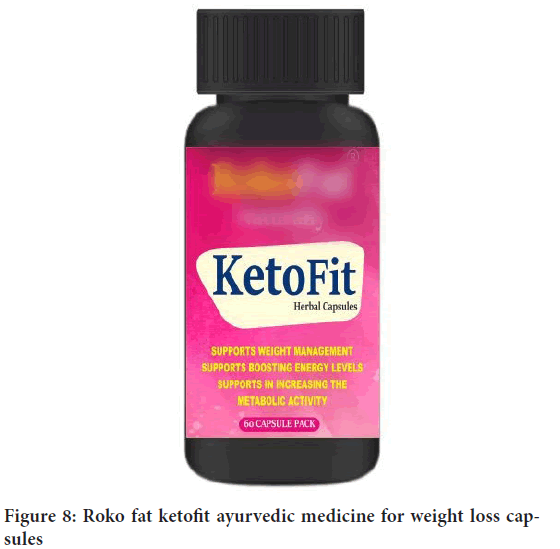
Figure 8: Roko fat ketofit ayurvedic medicine for weight loss capsules
Dr. Asma Herbals from Amritsar has also included a few more herbal substances in this formulation to increase the product’s effectiveness and focus on results. For instance, Trifla (33 percent of Amla, Bhera, and Herrar), Allium sativum (Lahsan), Enicostemma axillare (Nahi), Zingiber officinale (Sonth), Boerhaavia diffusa (Punarnava), Tribulus terrestris (Gokhru), and Trigonella foenum (Methi) (Brenot F, et al., 1993). There are some uses of this ayurvedic medicine for fat loss:
• Nahi (Enicostemma axillare): This herb’s leaf aids in reducing obesity (i.e. acts as a tonic for appetite loss). E. axillare is a nutrient-rich plant that contains a lot of iron, potassium, sodium, magnesium, silica, calcium, chloride, phosphate, sulfate, and vitamins B and C.
• Lasun (Allium sativum): Lasun has long been used to help people lose weight because it suppresses appetite by sending signals to the brain that a meal has satisfied one’s hunger. Individual is hence less likely to consume food. It also speeds up the body’s metabolism. This plant is thought to stimulate the release of the hormone adrenalin, which boosts metabolism, from the neurological system. A fast metabolism thus aids in efficient weight loss by allowing you to burn more calories (Connolly HM, et al., 1997).
• Sonth (Zingiber officinale): This herb acts as a thermogenic and promotes fat loss. Sonth is recommended for the treatment of obesity since it aids in increasing the body’s metabolic rate (i.e., increases metabolism by 20%). Sonth helps burn off part of the body fat that builds up by speeding up the metabolism. This herb enhances the feeling of fullness following a meal, which helps with weight reduction.
• Methi (Trigonella foenum): Galactomannan, a polysaccharide found in abundance in methi seeds, is responsible for the herb’s potent ability to help people lose weight. This herb makes you feel full, which helps you lose weight by reducing your appetite. It helps in maintaining a slim-trim physique.
• Kokam (Garcinia cambogia): The herb prevents carbs from being transformed into fats. Kokam then exerts its effect on the enzyme that is crucial for the synthesis of fatty acids and for the transformation of carbohydrates into lipids and triglycerides, delaying the creation of fats. Therefore, this Kokam characteristic is an added benefit for controlling levels of bad cholesterol i.e., Low Density Lipoproteins (LDL).
• Punarnava (Boerhaavia diffusa): Punarnavine, an alkaloid, is a component of this plant. Additionally, the plant is well renowned for being very effective in reducing obesity. It tends to effectively revive and replenish the body’s systems.
• Goksura (Tribulus terrestris): A powerful herb for use in anti-obesity treatment, Goksura is a well-known diuretic and improves exercise endurance.
• Trifla: Trifla helps cure obesity by fostering an environment that allows the body to process and eliminate toxins and waste products more often and unrestrictedly. The body may discharge more waste that has been held in storage for a longer period of time thanks to its well-known ability to cleanse the body (Swinburn BA, et al., 2004).
Weight management tips
• Performing regular, easy workouts like yoga or if you can, walking for 20 minutes.
• Eat a high-fiber, low-fat diet.
• Consume a lot of salads, fresh fruits and veggies.
• Sip 6 to 8 glasses of water each day (3 L).
• Set a diet, exercise, or walk schedule and then take Roko fat capsules for two to three months.
• Sipping on diet coke, lemon soda, or lemon water.
Prohibited items
• Alcohol, cold beverages, packaged juices, baked goods, and fatty foodstuffs.
• Beer, lamb, pig, beef, and red meat.
• Overindulgent consumption of fried meals, noodles, fried rice, tea, coffee, chocolates, candies, and ice cream.
• Consuming more sugar, salt, and Dalda oil.
• Banana, grapes, litchi, muskmelon, mangoes, and chikkoo.
• Turnip, potatoes, carrots, sweet potatoes, peas, and arbi.
Herbalife fat burner capsules
Herbalife Fat Burner is an excellent supplement for fat burning and weight reduction that can be used by both men and women, helping you to reach your fitness goals (Figure 9). Fat Shredder or fat burner pills are the best fat burner supplements for weight reduction (Park JP, et al., 2011).
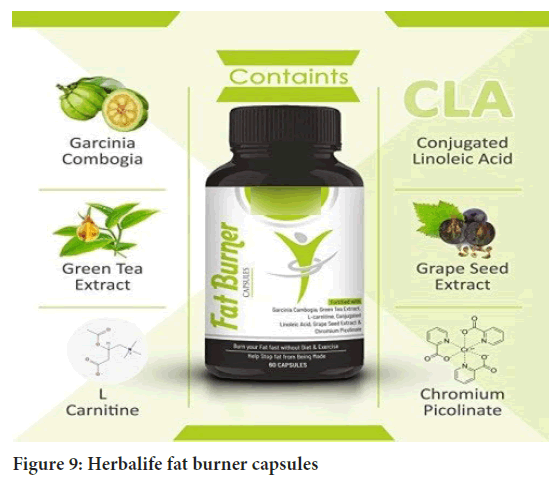
Figure 9: Herbalife fat burner capsules
Discussion
Once more, due to ineffective attempts at long-term weight loss by dieting and other techniques, many turn to herbal remedies.
Herbs can be helpful in the weight reduction process, but for herbal approaches to be effective, exercise and a healthy diet must also be included. To avoid any potential interactions with prescription medications or underlying medical issues, it is crucial to let your doctor know about the herbal remedies you’re using before attempting to lose weight with them.
However, herbal treatments for weight reduction are a long-term solution that might develop into an addiction. Worse even, if herbs and supplements are not used as directed, they can cause serious health issues and even be fatal. Obesity is an issue that affects the entire world, and in many countries where it is beginning to spread, traditional herbal remedies may be more widely accepted than modern pharmaceuticals, according to David Heber, the founding head of the University of California, Los Angeles (UCLA) Centre for Human Nutrition. For persons who are overweight or obese, taking herbs to reduce weight has two main advantages:
Herbs are regarded to be more natural than pharmaceutical drugs, making them safer. Since there is no apparent need for medical treatment, going herbal is considered as a more approachable answer.
Conclusion
While no one herb or herbal combination may suddenly melt away extra fat, several herbs can support weight reduction when used in conjunction with a good diet and exercise. Herbs used orally or as whole-plant supplements can help with weight reduction by reducing stress, promoting a regular metabolism, and supporting healthy stomach and elimination function. Practitioners can utilize herbs to support therapeutic lifestyle modifications for weight reduction through the use of food-grade teas, herbal medications, and other herbal preparations.
Authors Contributions
Ajay Ramdas Nannar participated in theme designing, direction and preparation of manuscript. While, Shendge Raosaheb S conducted visualisation and critical review of the manuscript and Kishor S Salunkhe also conducted visualisation.
Acknowledegements
The Authors are also grateful to the Batch of whole Pharmaceutics Department, M Pharmacy of Sanjivani college of Education and Research, Kopargaon, India for their kind support time to time. Also thankful to Research guide and mentor for guiding us in work and all Staff of Sanjivani college of Education and Research, Kopargaon, India.
References
- American Dietetic Association (ADA). Recommendations concerning supplement usage: ADA statement. J Am Diet Assoc. 1987; 87(10): 1342-1343.
- Breskin MW, Trahms CM, Worthington-Roberts B, Labbe RF, Koslowski B. Supplement use: Vitamin intakes and biochemical indexes in 40-to 108-month-old children. J Am Diet Assoc. 1985; 85(1): 49-56.
[Crossref] [Google Scholar] [Pubmed]
- Dreyfus PM. Diet and nutrition in neurologic disorders. Modem Nutrition in Health and Disease. 1988; 7: 1458-1470.
- FDA. Consumer Nutrition Knowledge Survey: Report I, 1973-74. Food and Drug Administration. 1974: 109.
- Greger JL. Food, supplements, and fortified foods: Scientific evaluations in regard to toxicology and nutrient bioavailability. J Am Diet Assoc. 1987; 87(10): 1369-1373.
[Crossref] [Google Scholar] [Pubmed]
- Kirsch A, Bidlack WR. Nutrition and the elderly: Vitamin status and efficacy of supplementation. Nutrition. 1987; 3(5): 305-314.
- Omenn GS, Goodman GE, Thornquist MD, Balmes J, Cullen MR, Glass A, et al. Effects of a combination of beta carotene and vitamin A on lung cancer and cardiovascular disease. N Engl J Med. 1996; 334(18): 1150-1155.
[Crossref] [Google Scholar] [Pubmed]
- Song Y, Cook NR, Albert CM, Van Denburgh M, Manson JE. Effects of vitamins C and E and β-carotene on the risk of type 2 diabetes in women at high risk of cardiovascular disease: A randomized controlled trial. Am J Clin Nutr. 2009; 90(2): 429-437.
[Crossref] [Google Scholar] [Pubmed]
- Hsia J, Heiss G, Ren H, Allison M, Dolan NC, Greenland P, et al. Calcium/vitamin D supplementation and cardiovascular events. Circulation. 2007; 115(7): 846-854.
[Crossref] [Google Scholar] [Pubmed]
- Cooke D, Bloom S. The obesity pipeline: Current strategies in the development of anti-obesity drugs. Nat Rev Drug Discov. 2006; 5(11): 919-931.
[Crossref] [Google Scholar] [Pubmed]
- Pinder RM, Brogden RN, Sawyer PR, Speight TM, Avery GS. Fenfluramine: A review of its pharmacological properties and therapeutic efficacy in obesity. Drugs. 1975; 10(4): 241-323.
[Crossref] [Google Scholar] [Pubmed]
- Brenot F, Herve P, Petitpretz P, Parent F, Duroux P, Simonneau G. Primary pulmonary hypertension and fenfluramine use. Br Heart J. 1993; 70(6): 537-541.
[Crossref] [Google Scholar] [Pubmed]
- Connolly HM, Crary JL, McGoon MD, Hensrud DD, Edwards BS, Edwards WD, et al. Valvular heart disease associated with fenfluramine-phentermine. N Engl J Med. 1997; 337(9): 581-588.
[Crossref] [Google Scholar] [Pubmed]
- Swinburn BA, Caterson I, Seidell JC, James WP. Diet, nutrition and the prevention of excess weight gain and obesity. Public Health Nutr. 2004; 7(1A): 123-146.
[Crossref] [Google Scholar] [Pubmed]
- Park JP, Kim JH, Park MK, Yun JW. Potential agents for cancer and obesity treatment with herbal medicines from the green garden. Biotechnol Bioprocess Eng. 2011; 16: 1065-1076.
Author Info
Ajay Ramdas Nannar*, Shendge S Raosaheb and Kishor S SalunkheReceived: 24-Apr-2023 Accepted: 19-May-2023 Published: 26-May-2023, DOI: 10.31858/0975-8453.14.5.360-365
Copyright: This is an open access article distributed under the terms of the Creative Commons Attribution License, which permits unrestricted use, distribution, and reproduction in any medium, provided the original work is properly cited.
ARTICLE TOOLS
- Dental Development between Assisted Reproductive Therapy (Art) and Natural Conceived Children: A Comparative Pilot Study Norzaiti Mohd Kenali, Naimah Hasanah Mohd Fathil, Norbasyirah Bohari, Ahmad Faisal Ismail, Roszaman Ramli SRP. 2020; 11(1): 01-06 » doi: 10.5530/srp.2020.1.01
- Psychometric properties of the World Health Organization Quality of life instrument, short form: Validity in the Vietnamese healthcare context Trung Quang Vo*, Bao Tran Thuy Tran, Ngan Thuy Nguyen, Tram ThiHuyen Nguyen, Thuy Phan Chung Tran SRP. 2020; 11(1): 14-22 » doi: 10.5530/srp.2019.1.3
- A Review of Pharmacoeconomics: the key to “Healthcare for All” Hasamnis AA, Patil SS, Shaik Imam, Narendiran K SRP. 2019; 10(1): s40-s42 » doi: 10.5530/srp.2019.1s.21
- Deuterium Depleted Water as an Adjuvant in Treatment of Cancer Anton Syroeshkin, Olga Levitskaya, Elena Uspenskaya, Tatiana Pleteneva, Daria Romaykina, Daria Ermakova SRP. 2019; 10(1): 112-117 » doi: 10.5530/srp.2019.1.19
- Dental Development between Assisted Reproductive Therapy (Art) and Natural Conceived Children: A Comparative Pilot Study Norzaiti Mohd Kenali, Naimah Hasanah Mohd Fathil, Norbasyirah Bohari, Ahmad Faisal Ismail, Roszaman Ramli SRP. 2020; 11(1): 01-06 » doi: 10.5530/srp.2020.1.01
- Manilkara zapota (L.) Royen Fruit Peel: A Phytochemical and Pharmacological Review Karle Pravin P, Dhawale Shashikant C SRP. 2019; 10(1): 11-14 » doi: 0.5530/srp.2019.1.2
- Pharmacognostic and Phytopharmacological Overview on Bombax ceiba Pankaj Haribhau Chaudhary, Mukund Ganeshrao Tawar SRP. 2019; 10(1): 20-25 » doi: 10.5530/srp.2019.1.4
- A Review of Pharmacoeconomics: the key to “Healthcare for All” Hasamnis AA, Patil SS, Shaik Imam, Narendiran K SRP. 2019; 10(1): s40-s42 » doi: 10.5530/srp.2019.1s.21
- A Prospective Review on Phyto-Pharmacological Aspects of Andrographis paniculata Govindraj Akilandeswari, Arumugam Vijaya Anand, Palanisamy Sampathkumar, Puthamohan Vinayaga Moorthi, Basavaraju Preethi SRP. 2019; 10(1): 15-19 » doi: 10.5530/srp.2019.1.3






